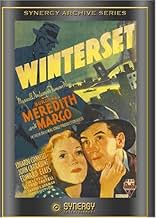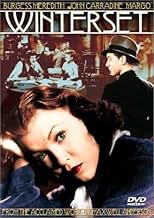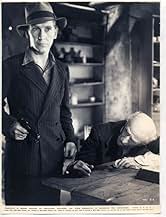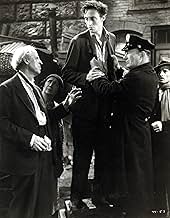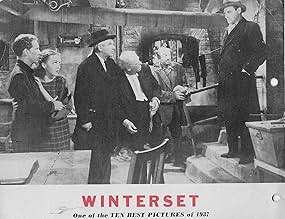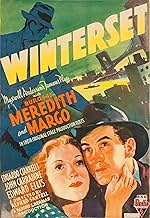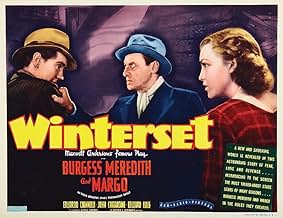Agrega una trama en tu idiomaImmigrant radical Bartolomeo Romagna is falsely condemned and executed for a payroll robbery. Years later, his son Mio sets out to find the truth of the crime and to bring to account the gan... Leer todoImmigrant radical Bartolomeo Romagna is falsely condemned and executed for a payroll robbery. Years later, his son Mio sets out to find the truth of the crime and to bring to account the gangster Trock Estrella.Immigrant radical Bartolomeo Romagna is falsely condemned and executed for a payroll robbery. Years later, his son Mio sets out to find the truth of the crime and to bring to account the gangster Trock Estrella.
- Dirección
- Guionistas
- Elenco
- Nominado a 2 premios Óscar
- 4 premios ganados y 4 nominaciones en total
Murray Alper
- Louie
- (sin créditos)
- Dirección
- Guionistas
- Todo el elenco y el equipo
- Producción, taquilla y más en IMDbPro
Opiniones destacadas
The chance to see Broadway players recreate their performances on film back in the day should never be missed. Burgess Meredith, Margo, and Eduardo Ciannelli recreate their stage roles from Winterset in this 1936 film. But the story itself is horribly dated, mostly with a lot of left wing rhetoric which gets in the way of the plot.
Probably back in 1936 no one cared as the cause of Sacco&Vanzetti was still fresh in everyone's mind. Today it is still debated by historians and legal scholars and the two working class Italian-Americans are still venerated in Italian-American households of a more liberal persuasion in their politics. But the average American today knows the case vaguely if at all today.
The men went to the electric chair in Massachusetts protesting their innocence as does John Carradine in this film. Before Carradine dies he imparts a sense of mission to his son who grows up to be Burgess Meredith to find the real guilty parties.
A review of the case by a law school class saying that the state electrocuted the wrong man brings new attention to the case, not something that Eduardo Ciannelli likes. He was the real trigger man in the case and now he's a big shot gangster.
Rather improbable events bring Meredith, Ciannelli, the judge Edward Ellis now a drunken derelict, Paul Guilfoyle another accomplice, Guilfoyle's father Maurice Moscovitch and his sister Margo all together on a rainy and stormy night.
Maxwell Anderson wrote the original play and I have to contrast it with another of his plays that made it to the screen, Key Largo. It was another film where various folks are trapped in a storm and interesting things happen. Winterset never really sheds its stage origins and can't shake the rhetoric. Contrast that to Key Largo which never loses your interest for a second and while most of the action takes place in a closed down out of season hotel where the cast is holed up you never get any sense of staginess in it. The rhetoric is there, but it never gets in the way of the story as in Winterset.
Even with Oscar nominations for Art Direction and Musical scoring Winterset is a relic of bygone days.
Probably back in 1936 no one cared as the cause of Sacco&Vanzetti was still fresh in everyone's mind. Today it is still debated by historians and legal scholars and the two working class Italian-Americans are still venerated in Italian-American households of a more liberal persuasion in their politics. But the average American today knows the case vaguely if at all today.
The men went to the electric chair in Massachusetts protesting their innocence as does John Carradine in this film. Before Carradine dies he imparts a sense of mission to his son who grows up to be Burgess Meredith to find the real guilty parties.
A review of the case by a law school class saying that the state electrocuted the wrong man brings new attention to the case, not something that Eduardo Ciannelli likes. He was the real trigger man in the case and now he's a big shot gangster.
Rather improbable events bring Meredith, Ciannelli, the judge Edward Ellis now a drunken derelict, Paul Guilfoyle another accomplice, Guilfoyle's father Maurice Moscovitch and his sister Margo all together on a rainy and stormy night.
Maxwell Anderson wrote the original play and I have to contrast it with another of his plays that made it to the screen, Key Largo. It was another film where various folks are trapped in a storm and interesting things happen. Winterset never really sheds its stage origins and can't shake the rhetoric. Contrast that to Key Largo which never loses your interest for a second and while most of the action takes place in a closed down out of season hotel where the cast is holed up you never get any sense of staginess in it. The rhetoric is there, but it never gets in the way of the story as in Winterset.
Even with Oscar nominations for Art Direction and Musical scoring Winterset is a relic of bygone days.
The drama itself is interesting to watch in this adaptation of Maxwell Anderson's play, and the themes that it brings out include some particularly weighty ones. The solid cast included at least three performers who were continuing their Broadway roles, and while the production does have a stagy feel at times, it often seems rather appropriate to the material.
The brief prologue shows a political extremist (who is presumably also an immigrant) wrongly accused and executed for a murder committed by a holdup gang. The circumstances are similar to those in some notorious real cases of a slightly earlier era, in which politically unpopular persons were railroaded into convictions because of the public's fear of their beliefs.
The main action starts with Burgess Meredith portraying the executed man's son, now an adult, and determined to get to the bottom of the case despite the obstacles that have come with time. In the course of things, he encounters the judge who had presided over his father's trial, a witness with important information, and a brutal crime boss who is determined to prevent the case from being re-opened. The setup produces some good psychological and ethical tensions, in addition to the drama on the surface.
Most of the supporting cast performs well. John Carradine has a brief role as the father, Margo has a good and important role as a young woman torn between family loyalty and her attraction to Meredith's character, and Eduardo Ciannelli believably portrays the soulless, desperate crime boss. Mischa Auer succeeds in a brief, atypical role as a street agitator. But Edward Ellis gives the best performance, as the judge whose conscience has been tormented ever since the fateful case. The characters and the tragic situation that links them are all effectively portrayed.
The brief prologue shows a political extremist (who is presumably also an immigrant) wrongly accused and executed for a murder committed by a holdup gang. The circumstances are similar to those in some notorious real cases of a slightly earlier era, in which politically unpopular persons were railroaded into convictions because of the public's fear of their beliefs.
The main action starts with Burgess Meredith portraying the executed man's son, now an adult, and determined to get to the bottom of the case despite the obstacles that have come with time. In the course of things, he encounters the judge who had presided over his father's trial, a witness with important information, and a brutal crime boss who is determined to prevent the case from being re-opened. The setup produces some good psychological and ethical tensions, in addition to the drama on the surface.
Most of the supporting cast performs well. John Carradine has a brief role as the father, Margo has a good and important role as a young woman torn between family loyalty and her attraction to Meredith's character, and Eduardo Ciannelli believably portrays the soulless, desperate crime boss. Mischa Auer succeeds in a brief, atypical role as a street agitator. But Edward Ellis gives the best performance, as the judge whose conscience has been tormented ever since the fateful case. The characters and the tragic situation that links them are all effectively portrayed.
Winterset starts out beautifully and profoundly. The story flows well, but the latter scenes are so implausibly constrained that I ended up losing sympathy for the characters. The dialog was hard to make sense of at times, and many of the movie's sequences look like dark scenes from a bad dream... you know, the kind of situation you just can't escape from.
It looks as though, in the transition to turning the stage play into a movie, the makers never gave much thought to overcoming the obvious limitations that the stage imposes on what we now think of as the "action sequences".
I don't regret the time spent watching Winterset. It was interesting, but as a movie (and even allowing for its vintage) it was just "OK".
It looks as though, in the transition to turning the stage play into a movie, the makers never gave much thought to overcoming the obvious limitations that the stage imposes on what we now think of as the "action sequences".
I don't regret the time spent watching Winterset. It was interesting, but as a movie (and even allowing for its vintage) it was just "OK".
Despite having read the liner notes, I thought from the publicity artwork that WINTERSET would be something Gothic. It is Gothic, in its bleakness, but is squarely centered in the Depression era of the United States. It was completely of it's time, and considering that the film was adapted from the Broadway play, it must have been daring, with sub themes of socialism and police corruption. (The play was by Maxwell Anderson, who wrote KEY LARGO and THE BAD SEED.) Perhaps that contributed to the film receiving two Academy Award nominations.
This is the story of Mio (Bartholomio a young, dewy Burgess Merideth) trying to clear his father's name. In the first scenes, his namesake Father, played with riveting stillness by the painfully thin John Carradine, was accused of murder he did not commit, given no defense, and put to death. Years later, his son goes to the slums of New York to try to find out the truth.
I had to remind myself that this was made in 1936, so it is still very early in the talkies. The sets are a wonderful blend of realism and expressionism (similar to the famous stage sets of Arthur Miller's A VIEW FROM THE BRIDGE), giving this a Gothic noir flavor. Rain is often used as a "purifier" in stage and film, but here it is effectively used to create an oppressive humidity, a torrent of sludge. It is clear that film noir, Orson Wells, and THE THIRD MAN's Director Carol Reed all owe a debt to early films like this. The set elements are all here in tight proximity, the stone, the shadowed doorways, the waterways.
In fact, one irony is that one of the lead actors does look very much like Orson Wells. He plays the brother of Mariama (played by Margot, who is probably best known as the duplicitous woman in Capra's LOST HORIZON). Margot's transition to film is not as ideal as Merideth's, her style is more of the old school careful vocal production that may be the product of overcoming an accent. But she looks luminous and innocent, and fills the screen with a simple hopefulness at odds with the dark surroundings. The villain of the piece is simply fantastic completely believably sociopathic without any extravagant ticks or frothing at the mouth.
This is pre-method-acting, but that spare realism is all here, especially in the performances of Carradine and Merideth. This entire film holds up as a moment of history of social themes and thought of that day that still resonate. The Broadway cast seems to have been lifted intact (which should be a lesson to modern filmmakers to use stage actors instead of vice-verse). There are one or two flowery monologues, but for the most part, the transition from stage to film goes very well, and the story and script are spare and universal enough to stand the test of time well. This is a fascinating moment of film history which has luckily made its way to DVD.
This is the story of Mio (Bartholomio a young, dewy Burgess Merideth) trying to clear his father's name. In the first scenes, his namesake Father, played with riveting stillness by the painfully thin John Carradine, was accused of murder he did not commit, given no defense, and put to death. Years later, his son goes to the slums of New York to try to find out the truth.
I had to remind myself that this was made in 1936, so it is still very early in the talkies. The sets are a wonderful blend of realism and expressionism (similar to the famous stage sets of Arthur Miller's A VIEW FROM THE BRIDGE), giving this a Gothic noir flavor. Rain is often used as a "purifier" in stage and film, but here it is effectively used to create an oppressive humidity, a torrent of sludge. It is clear that film noir, Orson Wells, and THE THIRD MAN's Director Carol Reed all owe a debt to early films like this. The set elements are all here in tight proximity, the stone, the shadowed doorways, the waterways.
In fact, one irony is that one of the lead actors does look very much like Orson Wells. He plays the brother of Mariama (played by Margot, who is probably best known as the duplicitous woman in Capra's LOST HORIZON). Margot's transition to film is not as ideal as Merideth's, her style is more of the old school careful vocal production that may be the product of overcoming an accent. But she looks luminous and innocent, and fills the screen with a simple hopefulness at odds with the dark surroundings. The villain of the piece is simply fantastic completely believably sociopathic without any extravagant ticks or frothing at the mouth.
This is pre-method-acting, but that spare realism is all here, especially in the performances of Carradine and Merideth. This entire film holds up as a moment of history of social themes and thought of that day that still resonate. The Broadway cast seems to have been lifted intact (which should be a lesson to modern filmmakers to use stage actors instead of vice-verse). There are one or two flowery monologues, but for the most part, the transition from stage to film goes very well, and the story and script are spare and universal enough to stand the test of time well. This is a fascinating moment of film history which has luckily made its way to DVD.
WINTERSET was a big hit on Broadway and RKO's decision to retain Burgess Meredith, Margo, and Eduardo Ciannelli to repeat their original stage roles is a major reason for the success of the film version. That they were able to adapt their performances to the intimacy of the camera is remarkable. Maxwell Anderson's dialogue is naturalized considerably from its poetic original but enough of the beautiful lyricism is retained in Anthony Veiler's screenplay to make it a very special script. While Ted Hecht must have been very good on Broadway as Garth, Paul Guilfoyle's performance in the film resulted in perhaps his best and most important screen work. Two other performances deserve special mention. Stanley Ridges as Shadow is menacing without being paranoid as is his boss, played by Ciannelli. Ridges' bloody appearance in the Esdras doorway is one of the most shocking screen moments in 30's cinema. And Willard Robertson, who made a career out of playing impatient meanies is beautifully obstinate as the boorish patrolman. Russian actor Maurice Moscovitch makes his screen debut as Garth and Miriamme's father. A veteran of the Yiddish Theater, Moscovitch later played Paulette Goddard's father in THE GREAT DICTATOR but died before that picture's release. Another Russian, Mischa Auer, makes one of his rare dramatic appearances as a social radical.
The physical set is beautiful, especially the stone-style recreation of the alley and stairwells beneath the Brooklyn Bridge. Finally, the film boasts a rare original score by Nathaniel Shilkret. Shilkret was a longtime bandleader who made records for RCA. He was hired as part of the RKO music staff in 1936 to replace Max Steiner who was leaving to join fledgling org Selznick-International. Shilkret's bold compositions for WINTERSET enhance the theatricality of film, though most of the dupe prints extant on video reproduce the soundtrack with very limited fidelity.
For modern audiences with little patience for plays-made-into-films that represent their stage origins, WINTERSET will be a disappointment. But for those who can appreciate the care with which director Alfred Santell took to recreate much of the prosaic beauty of the Broadway original, WINTERSET will be a rewarding experience - if you can see it in a respectable copy.
The physical set is beautiful, especially the stone-style recreation of the alley and stairwells beneath the Brooklyn Bridge. Finally, the film boasts a rare original score by Nathaniel Shilkret. Shilkret was a longtime bandleader who made records for RCA. He was hired as part of the RKO music staff in 1936 to replace Max Steiner who was leaving to join fledgling org Selznick-International. Shilkret's bold compositions for WINTERSET enhance the theatricality of film, though most of the dupe prints extant on video reproduce the soundtrack with very limited fidelity.
For modern audiences with little patience for plays-made-into-films that represent their stage origins, WINTERSET will be a disappointment. But for those who can appreciate the care with which director Alfred Santell took to recreate much of the prosaic beauty of the Broadway original, WINTERSET will be a rewarding experience - if you can see it in a respectable copy.
¿Sabías que…?
- TriviaBurgess Meredith, in his first film with a credited role, recreates the role he played in the original Broadway production.
- ConexionesFeatured in Sprockets: Masters of Menace (1995)
Selecciones populares
Inicia sesión para calificar y agrega a la lista de videos para obtener recomendaciones personalizadas
- How long is Winterset?Con tecnología de Alexa
Detalles
- Fecha de lanzamiento
- País de origen
- Idiomas
- También se conoce como
- Under New Yorks broar
- Locaciones de filmación
- Productora
- Ver más créditos de la compañía en IMDbPro
- Tiempo de ejecución1 hora 17 minutos
- Color
- Relación de aspecto
- 1.37 : 1
Contribuir a esta página
Sugiere una edición o agrega el contenido que falta

Principales brechas de datos
By what name was Winterset (1936) officially released in India in English?
Responda
